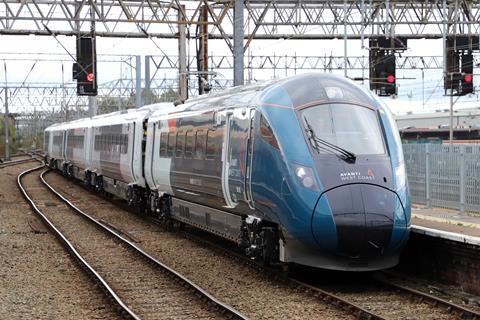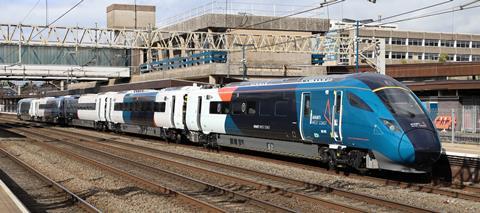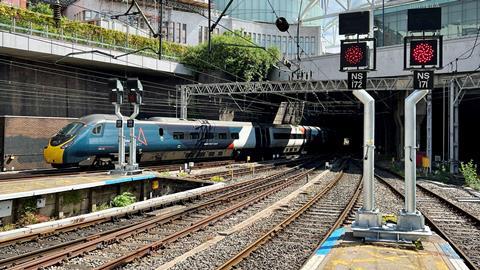UK: Heading a business lashed by criticism over service cuts at the end of last year, Avanti West Coast Managing Director Andy Mellors is prioritising driver training and recruitment as a basis for future growth. But, as he explains to Rail Business UK, there will be no return to the pre-Covid operating plan on Europe’s busiest mixed-use railway.

Few operators are under as much pressure as Avanti West Coast. The West Coast Main Line inter-city operator remains the target of vociferous criticism, notably from local politicians in northern England, as it battles to restore resilience to its operations after months of industrial relations problems and staff shortages.
At the start of 2024, Managing Director Andy Mellors — a native of Tamworth on the WCML — is plotting a complex path towards service recovery, with an eye to restoring growth to what many would consider the country’s most strategically important rail route. But he is certain that while the pre-Covid pattern of three trains per hour between London and Manchester has been restored, and a similar pattern to Birmingham is gradually being reintroduced, there will be no return to prioritising headline journey times as seen in 2010-19 in the wake of the West Coast Route Modernisation.
‘There will be no return to prioritising headline journey times’
Instead, Mellors’ focus is on the short term need to reintroduce a financially and operationally viable timetable that its passengers can rely on. There was a furore in December 2023, when the company pre-emptively cut services to reflect a high level of staff absence, before being forced into even more short-notice cancellations. Apologising to passengers at the time, Avanti explained that train crew shortages were linked to ‘historic leave agreements and ongoing industrial disputes’.
AWC’s critics, led by Greater Manchester Metro Mayor Andy Burnham, pointed out that when the Department for Transport let a nine-year National Rail Contract to AWC in October 2023, the department had stated the business was ‘back on track’. On December 19, Burnham called on Transport Secretary Mark Harper to launch a ‘critical review’ of AWC’s operations because of ‘the deteriorating service being endured by passengers’, which he argued ‘cannot be allowed to continue’.
Driver establishment
Mellors believes that some of the recent adverse press coverage of Avanti’s issues ‘conflated a number of factors’, including a series of engineering blockades which would alone have required a significant cut in the number of trains in and out of London Euston on weekends in December.
Industry sources have suggested to Rail Business UK that up to a fifth of Avanti’s drivers were unavailable on a number of days in the run up to the Christmas period, and there is concern that a similar situation could resurface in the summer of 2024.
Nevertheless, Mellors is sanguine about the need to address drivers’ annual leave, along with wider issues of staff retirement and recruitment. The leave agreement dates back to the previous franchise, and it gives crews a mixture of rostered leave and ‘floating days’, which resulted in exceptionally high demand for leave that had to be taken by the end of 2023. ‘It’s a historic arrangement, but it is fixed to a calendar year, rather than a timetable change date’, he explains, acknowledging that in the past this had been managed by ‘liberal amounts’ of Rest Day Working.
According to Mellors, AWC made its pre-planned reductions to timetables partly based on research by watchdog Transport Focus which has shown that inter-city passengers value certainty that their particular train will run more highly than service frequency. Nevertheless, he accepts that the operator does need to ‘encourage a better spread of that leave throughout the year, so that it’s not the customer that experiences the volatility of resource provision’.
Rest Day Working agreement
Rest Day Working — a form of voluntary overtime — has been a recurring theme throughout the industrial relations disputes that have disrupted the UK rail industry since early 2022. Rail Business UK understands from industry sources that Avanti’s most recent RDW agreement expired in late November 2023.
The business has made it clear that it is working towards ending its reliance on the practice. However, few operators are able to phase it out fully; RDW is often needed to even out peaks and troughs in staff availability, and it can provide flexibility for crew training related to network changes such as track remodelling. Nevertheless, Mellors insists that Avanti needs to deliver a core timetable which ‘should not rely’ on RDW.
Meanwhile, he says AWC is continuing to invest in recruitment and training of drivers ‘in unprecedented numbers for this business and its predecessors’. Mellors emphasises that Avanti is not actively seeking to recruit from other operators, but he dismisses suggestions that higher-paying operators are being specifically asked to stop attracting drivers from other businesses, which has happened in the past. ‘That’s not an instruction that I’m aware of’, he says.
Reflecting on ‘some of the training arrangements that have been agreed in the past in this business’, he suggests that ‘there’s not an awful lot of difference’ in time needed between recruiting qualified or trainee drivers. This is because many drivers elsewhere in UK rail are required to give six months’ notice before leaving.
‘AWC is continuing to invest in recruitment and training of drivers “in unprecedented numbers”’
AWC now has ‘about 80 trainees in the system’, equating typically to ‘one or two new drivers coming out of the training machine every week’. But he is cautious about how quickly these benefits will filter through to service delivery. ‘We are at the point where 30% of our drivers are aged 55 or over, so this is two steps forward, one step back. We intend to maintain the current level of training for the next few years [so that] we can support an uplift to the timetable without any reliance on RDW.’
He agrees with other senior figures in the industry, who report that despite pressure from the Treasury to keep a tight grip on costs, the need to maintain a high level of recruitment and training is well understood in government circles.
Hitachi fleet roll-out
A further staff training complication stems from the imminent introduction of AWC’s fleet of Class 805/807 trainsets being supplied by Hitachi. ‘We’re at an advanced stage of discussions with both trade unions about the fleet introduction, recognising that these trains are not dissimilar to Hitachi trains that have been introduced elsewhere’, Mellors reports.

The aspiration for their entry into service is the middle of the year, but Mellors acknowledges that this depends on the availability of staff. ‘In-service training can be a more efficient way of delivering training, so we’re really keen to get to a position where we can resource initial passenger operation’, he explains.
The number of routes to be served by the trains adds to the challenge. Hitachi is supplying 10 seven-car Class 807 electric trainsets with 453 seats, and 13 five-car Class 805 electro-diesel trains with 301. Both sub-fleets will be based at Oxley depot in Wolverhampton, but the trains will operate on routes serving North Wales, Blackpool and Liverpool. They are also due to be used on some London – Birmingham diagrams. ‘Effectively we’ve got five of our eight depots where drivers will need to learn them’, Mellors notes. ‘That’s not necessarily everyone in each depot, but it’s getting on for about half our driver workforce.’
Despite interest from several potential operators in AWC’s current fleet of Class 221 Voyager DEMUs which the Hitachi trains will supersede, he says the operator has negotiated some flexibility with owner Beacon Rail to ease the pressure to hand them back. ‘There is a desire to release some 221s sooner rather than later, but we’ve got to make sure that ultimately it’s not the delivery to the customer that suffers.’
Avanti is keen to make a splash with the arrival of the new rolling stock, as it is more than 20 years since Virgin Trains renewed the Inter-City West Coast fleet by introducing the Class 390 Pendolino tilting trains. Looking ahead to a ‘wow factor’, Mellors says ‘investment in a new fleet is a big deal for us. Even though it’s a train that others have had, we intend to make a big thing about it, because it shows us moving forward.’
He reports that those who have driven the Hitachi trainsets so far have been ‘very impressed’ with them, describing their performance as ‘magnificent’, and the transition from diesel to electric power on the Class 805 fleet as ‘seamless’.
Growth aspiration
When AWC’s owners FirstGroup and Trenitalia placed the £350m order for the Hitachi sets in early December 2019, they were not to know that a global pandemic was imminent. Now the trains are in commissioning phase, questions are being asked as to whether the fleet could leave the operator with a capacity surplus.
The 23 trainsets are intended to replace 20 five-car Voyager sets, two of which have already been stood down. Meanwhile, AWC is running fewer trains than it was before Covid. At the start of what was then a conventional franchise, Avanti set out a series of growth ambitions which included a long-held aim to run a second train each hour between London Euston and Liverpool Lime Street.
Despite the recovery in rail use since the pandemic, Mellors now strikes a more cautious tone. ‘There’s no doubt about it; the challenges around the industry’s finances are well documented and we’ve got a responsibility to use taxpayers’ money wisely. But, we are really confident that we can grow our business with timetable uplifts when they can be delivered resiliently. We also feel positive regarding Merseyside [getting] two trains per hour.’ This includes the ability to serve Liverpool South Parkway, as the Hitachi fleet is fitted with Selective Door Opening equipment.
‘We’ve got a responsibility to use taxpayers’ money wisely’
Clearly, none of these uplifts can be introduced with confidence until AWC’s day-to-day operations are running more reliably. But he feels strongly that AWC will have ‘absolutely’ the right fleet, noting too the potential of the Hitachi sets to improve air quality at key hubs such as Birmingham New Street and London Euston by eliminating diesel use.
Nevertheless, Mellors is adamant that growth can only be incremental. ‘We announced some improvements as part of our December timetable. We think by next summer we’ll be in a position where we can contemplate running some additional services.’ He is firm that the pre-2019 focus on the business market with fast end-to-end journey times will not return; stopping patterns have already been adjusted to suit demand in the post-Covid market. For example, there has been an increase in intermediate calls by London – Manchester services at Nuneaton and Stafford, the latter replacing a stop on London – Liverpool trains.
‘The Nuneaton call was done because it’s revenue generative, that’s introduced a whole load of journey opportunities from the connectivity east to west. Having grown up in Tamworth, I asked these sorts of questions about the Trent Valley’, Mellors admits. Another benefit of calling at Nuneaton is that the station has a platform on the WCML Fast lines, which reduces the time penalty relative to stops at other intermediate points.
Discussions continue over restoring a full service to Shrewsbury and the North Wales coast, but again this depends on driver resources. ‘We are naturally thinking about the taxpayer value for money test’, he confirms. ‘We will have to look very closely at where additional trains run, and the time of day that they operate as well. ‘The Hitachi trains will in any case deliver an uplift in capacity; a five car Class 805 has more seats than a five car Voyager.’
Post-Covid market
A consensus has emerged since the pandemic that DfT and the Treasury are determined to control costs in the rail sector; industry sources report that this came at the expense of incentivising operators to grow revenue, which is now being passed directly to the government under the National Rail Contract model.
Fortunately, Mellors sees signs that this attitude may be starting to change. ‘We are going through the annual business planning round with DfT now, and I think the messaging that addressing costs alone is not going to enable the industry to meet its financial challenge has been heard’, he says. Discussions with DfT and Treasury are focused more on ‘net position, rather than costs in isolation, because that is not going to get us the railway that we and our stakeholders aspire to’.
Mellors insists that ‘we’re actually looking at things that will make a difference to the bottom line. The “spend a pound to earn two or three” approach is very much in our thinking. We want to get on the front foot in the New Year, with the expectation that our driver resourcing position will continue to improve so that we can start running additional services.’
Nevertheless, the operator must tread carefully, as it is still seeing fewer journeys overall than before Covid, and those are being made at a lower yield. ‘We have to be realistic and admit that an 85% journey recovery is not translating into 85% of revenue in real terms, so there’s a lot to do’, Mellors maintains. Nevertheless, he says the company has been given the freedom to try things, such as the ‘really innovative’ Superfare promotion that discounts fares if passengers specify flexibility about when they could travel, for example by selecting morning or afternoon. The back-office then allocates them to a specific train with seats available within that time slot.
‘The “spend a pound to earn two or three” approach is very much in our thinking’
‘Our analysis says we are generating additional revenue’, Mellors reports. ‘We’ve got to reflect the fact we’ve still got capacity on our trains at certain times. We’ve got to win back customers and Superfare is a good example of an innovative product within the current contractual framework.’
But he reiterates that his first priority is stability. ‘There’s still more work to do, but once we’ve got that stability, we can get on the front foot with that growth narrative. I think there’s everything to play for.’
HS2 axe casts a long shadow

The decision by Prime Minister Rishi Sunak last October to cancel Phase 2 of the High Speed 2 network in the Midlands and northern England has not surprisingly prompted much debate over the future role and development of the West Coast Main Line.
Under current plans, from the early 2030s HS2 services will join and leave WCML at Handsacre Junction near Lichfield. This poses a serious capacity challenge on the WCML between there and Crewe, which remains a strategically vital junction and a station in much need of renewal. As well as running day-to-day Inter-City West Coast operations, FirstGroup and Trenitalia’s West Coast Partnership includes a ‘shadow operator’ function intended to develop proposals for HS2 services.
Mellors believes that the WCP team has ‘a level of expertise’ in operations, and ‘we are considering now the implications of the recent announcement’. He adds that ‘HS2 was always going to be built in phases anyway, so there were a number of different configuration timetables that we had developed’ in conjunction with DfT. These will now have to be reviewed, he explains, alongside the uncertainty over the future London terminus. ‘That’s what the role of the shadow operator actually is’, he insists.




